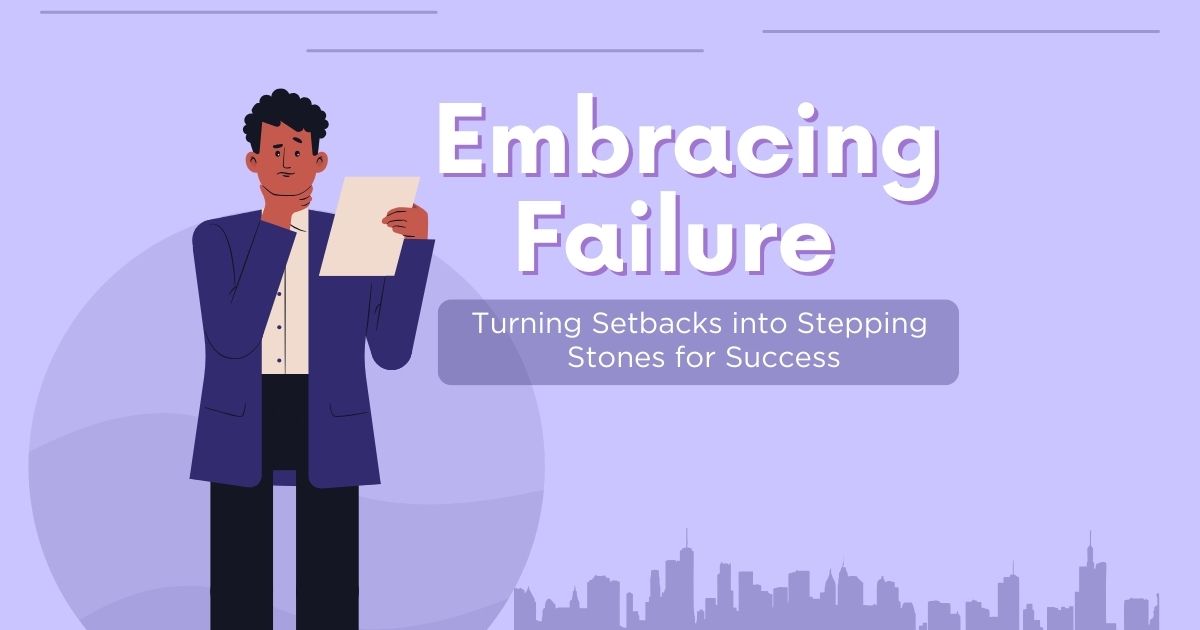Failure is often perceived as a negative outcome, but in the world of entrepreneurship, it can be one of the most valuable learning experiences. Embracing failure and turning setbacks into stepping stones for success is a mindset that many successful entrepreneurs have adopted. This article explores the stories of well-known entrepreneurs who faced failures and transformed them into opportunities, along with practical advice on how to cultivate a resilient mindset to do the same.
Introduction: The Value of Failure
Failure is an inevitable part of the entrepreneurial journey. It’s through failure that we learn, grow, and ultimately achieve success. Adopting a mindset that views failure as a learning opportunity rather than a defeat is crucial for long-term success. This mindset allows entrepreneurs to navigate setbacks with resilience and turn challenges into opportunities for growth.
Stories of Successful Entrepreneurs Who Embraced Failure
1. Steve Jobs
Steve Jobs, the co-founder of Apple, experienced significant failures throughout his career. In 1985, Jobs was ousted from Apple, the company he co-founded. Instead of seeing this as the end, Jobs viewed it as an opportunity to start anew. He founded NeXT, a computer platform development company, and acquired Pixar, which became a groundbreaking animation studio. His experiences during this period of failure ultimately led to his return to Apple in 1997, where he spearheaded the development of iconic products like the iPod, iPhone, and iPad, transforming Apple into one of the most valuable companies in the world.
2. Thomas Edison
Thomas Edison, one of history’s greatest inventors, faced numerous failures before achieving success. Edison is famously known for his persistence in the face of failure, having conducted thousands of unsuccessful experiments before inventing the light bulb. He viewed each failure as a step closer to success, famously stating, “I have not failed. I’ve just found 10,000 ways that won’t work.” Edison’s relentless pursuit of his goals and his ability to learn from failure led to his eventual success and lasting legacy.
3. Oprah Winfrey
Oprah Winfrey’s journey to success was marked by numerous setbacks. Early in her career, she faced rejection and criticism, including being fired from her job as a television news anchor. Instead of letting these failures deter her, Winfrey embraced them as learning experiences. She went on to create and host “The Oprah Winfrey Show,” which became one of the most successful talk shows in television history. Winfrey’s ability to turn setbacks into stepping stones for success has made her a global media mogul and a powerful inspiration for many.
4. J.K. Rowling
J.K. Rowling, the author of the Harry Potter series, experienced significant failures before achieving literary success. Rowling faced numerous rejections from publishers and struggled with personal hardships, including unemployment and single parenthood. Despite these setbacks, she persisted in her writing. Her perseverance paid off when the Harry Potter series became a global phenomenon, making her one of the best-selling authors in history. Rowling’s story highlights the importance of resilience and determination in the face of failure.
Adopting a Mindset to Embrace Failure
To turn setbacks into stepping stones for success, entrepreneurs need to adopt a mindset that embraces failure as a natural part of the journey. Here are practical steps to cultivate this mindset:
1. Reframe Failure as a Learning Opportunity
Instead of viewing failure as a negative outcome, reframe it as a valuable learning experience. Ask yourself what went wrong, what you can learn from it, and how you can improve in the future. This shift in perspective helps you see failure as a stepping stone rather than a stumbling block.
2. Cultivate Resilience
Resilience is the ability to bounce back from setbacks and keep moving forward. Cultivate resilience by developing a strong sense of purpose, maintaining a positive attitude, and building a support network of mentors, peers, and advisors who can provide guidance and encouragement.
3. Set Realistic Goals
Set realistic and achievable goals to maintain motivation and reduce the fear of failure. Break down larger objectives into smaller, manageable tasks, and celebrate your progress along the way. Realistic goal-setting helps you stay focused and build confidence.
4. Embrace Risk-Taking
Entrepreneurship inherently involves risk. Embrace calculated risks and understand that failure is a potential outcome. By accepting risk as part of the process, you can approach challenges with a more open and innovative mindset.
5. Practice Self-Compassion
Be kind to yourself when you experience failure. Acknowledge your efforts and remind yourself that everyone encounters setbacks. Practicing self-compassion helps you maintain a positive outlook and fosters a growth mindset.
6. Learn from Others
Seek inspiration from the stories of successful entrepreneurs who have faced failures. Reading biographies, attending talks, and engaging with mentors can provide valuable insights and motivation. Learning from others’ experiences can help you navigate your own challenges more effectively.
Practical Steps to Turn Setbacks into Opportunities
- Analyze the Failure: Take time to thoroughly analyze what went wrong. Identify the factors that contributed to the failure and consider alternative approaches for the future. This analysis provides valuable insights that can guide your next steps.
- Pivot and Adapt: Use the lessons learned from failure to pivot and adapt your strategies. Be open to change and willing to adjust your plans based on new information. Flexibility and adaptability are key to turning setbacks into opportunities.
- Innovate and Experiment: Embrace a culture of innovation and experimentation. Encourage creative thinking and explore new ideas without the fear of failure. Innovation often arises from the willingness to take risks and learn from mistakes.
- Build a Support System: Surround yourself with a supportive network of mentors, peers, and advisors. Seek their guidance and feedback during challenging times. A strong support system provides encouragement and helps you stay focused on your goals.
- Maintain a Long-Term Perspective: Keep a long-term perspective and remember that setbacks are temporary. Focus on your overarching vision and goals, and use failures as stepping stones to achieve them. Persistence and determination are essential for long-term success.
Conclusion: Embrace Failure for Success
Embracing failure and turning setbacks into stepping stones for success is a powerful mindset that can transform your entrepreneurial journey. By learning from the experiences of successful entrepreneurs and adopting practical strategies, you can navigate challenges with resilience and turn failures into opportunities for growth.
At CEO Space International, we are committed to supporting entrepreneurs in their pursuit of success. Our Inspire membership offers valuable resources, networking opportunities, and expert insights to help you develop a resilient mindset and achieve your business goals.
Call to Action: Join Our Free Inspire Membership
Embrace the power of failure and turn setbacks into stepping stones for success. Join our free Inspire membership today and gain access to valuable resources and support. Visit Inspire Membership to get started.

